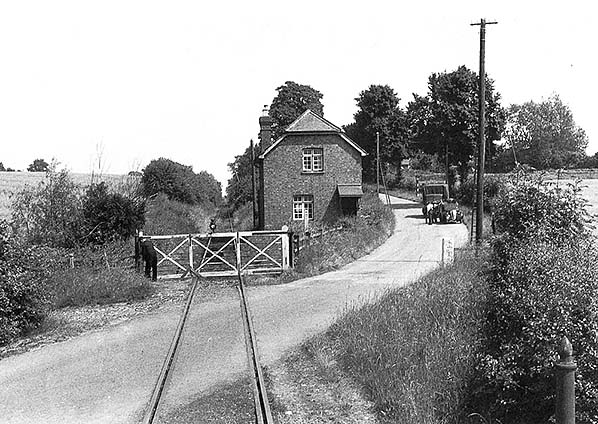
Station Name: SHIPSTON ON STOUR[Source: Darren Kitson]
 The level crossing and keeper's cottage at Darlingscote Road. The cottage was photographed on the 2nd of July 1953 from the brake van of the Shipston-on-Stour to Moreton-in-Marsh goods train. This view faces east and the guard is seen closing one of the crossing gates. The location is about three quarters of a mile west north-west of Shipston station as the proverbial crow flies but a little over one mile by rail due to the peculiar course of the railway - a legacy of the never-built extension to the Hinckley Coalfields. These cottages were to a more-or-less standard GWR design but this example has clipped gables whereas that at the Fosse Way crossing, about a quarter mile behind the camera, did not. The reason for this variation, which is evident along the entire length of the branch, is unexplained. At one time the GPO (General Post Office) was responsible for most forms of communications; letters and postcards etc., telegrams and the telephone system. The latter was operated under the GPO's ‘Post Office Telephones’ branding. Before the widespread use of underground cables, telephone wires, as they were commonly called, were carried by telegraph poles alongside roads. In some instances the telephone system piggybacked on the railways' lineside telegraph system. The term ‘telegraph’ is short for ‘Electric Telegraph’ which harks back to the time when Morse Code messages were transmitted by wire and in the case of the railways, tapped, coded messages sent between signal boxes. When walking along a quiet country lane a 'singing' sound could be heard from the telephone wires when a call was being made and if this occurred after dark it could make for a quite eerie experience. The system of course, required maintenance and repairs. Repair vehicles of Post Office Telephones were a common sight in their dark green livery. Among these vehicles in the 1950s were the Morris Z van and the Austin K3 Mobile Stores lorries, the latter usually with canvas tilt. Examples of both types can be seen here on the right. Later, the Post Office Telephones livery changed to yellow and is perhaps best remembered on the fleet of Morris 1000 vans. All this was swept away with Mrs Thatcher's selling off of the public services, the telephone service becoming what we now know as BT
Photo from John Mann collection stour9.jpg) The site of Darlingscote Road level crossing in 2023. The cottage has been extended over the trackbed and another part of the trackbed has been made into a driveway. Window shutters have been fitted and some of these crossing cottages had shutters either as built or added at the request of the railway employee tenants subsequently. Since the 1953 view, the road has been widened and in doing so the bend has been eased slightly. The road level has also been raised. The site of Darlingscote Road level crossing in 2023. The cottage has been extended over the trackbed and another part of the trackbed has been made into a driveway. Window shutters have been fitted and some of these crossing cottages had shutters either as built or added at the request of the railway employee tenants subsequently. Since the 1953 view, the road has been widened and in doing so the bend has been eased slightly. The road level has also been raised.Photo by Diane Miller
|
 Home Page
Home Page